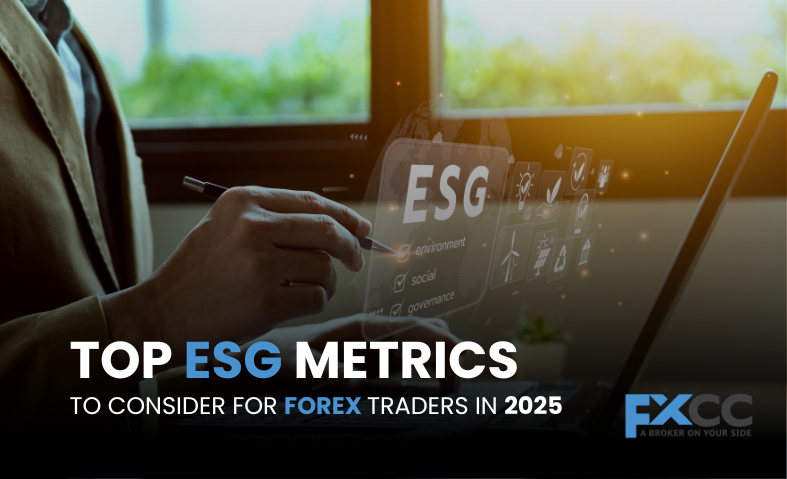The world of forex trading is evolving rapidly, with Environmental, Social, and Governance (ESG) factors becoming increasingly vital for traders seeking long-term growth and stability. ESG metrics, once seen as niche, now serve as essential indicators of a company’s or nation’s economic sustainability and ethical standing. In this article, we’ll explore the top ESG metrics that forex traders should prioritize in 2025 to stay ahead of market trends while contributing to a more responsible financial ecosystem.
1. Environmental Metrics
Environmental sustainability plays a critical role in determining the long-term prospects of economies. Forex traders need to consider how nations and corporations address environmental concerns, as these can significantly impact currency strength.

a) Carbon Emissions and Climate Policies
Nations actively reducing carbon emissions or implementing strong climate policies often enjoy higher economic stability. Countries leading in renewable energy adoption and reducing dependence on fossil fuels attract foreign investments, strengthening their currencies.
b) Natural Resource Management
Forex traders should monitor how countries manage their natural resources, such as water, forests, and minerals. Poor resource management can deplete economic potential, leading to long-term currency devaluation.
c) Transition to Renewable Energy
The transition to renewable energy sources is a key indicator of economic resilience. Countries investing in wind, solar, and hydro energy tend to experience economic growth, bolstering the strength of their currency in global markets.
2. Social Metrics
Social factors influence a nation’s workforce productivity, economic stability, and attractiveness to investors. These factors play a critical role in forex trading by shaping the broader economic climate.
a) Labor Standards and Workforce Health
Countries with strong labor protections, equitable wages, and healthy working conditions create a productive and stable workforce. This stability translates into sustained economic growth, supporting stronger currency values.
b) Education and Skill Development
Forex traders should evaluate the quality of education and vocational training in different countries. A skilled workforce contributes to innovation and economic advancement, improving a nation’s global standing.
c) Social Inequality
High levels of social inequality can lead to political unrest and economic instability, negatively impacting a country’s currency. Traders should focus on countries with policies aimed at reducing income and gender disparities.
3. Governance Metrics
Good governance underpins economic stability and confidence in a nation’s financial system. Traders need to evaluate governance metrics to predict currency movements and investment attractiveness.
a) Corruption Levels
Corruption erodes investor trust and creates inefficiencies in the economy. Forex traders should monitor corruption indices and prioritize countries with transparent governance systems for more stable currency performance.
b) Regulatory Framework
A well-regulated financial system fosters investor confidence. Forex traders should assess the robustness of a country’s monetary policies, trade agreements, and banking regulations.
c) Political Stability
Political uncertainty can significantly affect forex markets. Nations with stable governments and clear economic policies tend to experience less currency volatility, making them favorable for trading.
4. ESG Ratings and Forex Market Sentiment
ESG ratings have become critical tools for evaluating the economic potential of countries and corporations. Forex traders should incorporate ESG scores from reputable agencies into their strategies to make informed trading decisions.
- ESG Integration in Trading Platforms: Many forex brokers now provide ESG data directly through their platforms, allowing traders to track these metrics in real time.
- Market Sentiment: Currencies of nations with strong ESG performance often attract more investors, leading to higher demand and appreciation in value.
5. Balancing Profitability with Responsibility
Forex trading has traditionally focused on short-term profits, but incorporating ESG metrics allows traders to align financial goals with ethical considerations. While ESG factors may not always yield immediate profits, they provide a framework for assessing long-term risks and opportunities.
- Ethical Trading Practices: Traders who prioritize ESG metrics contribute to global sustainability while minimizing risks tied to unethical economic practices.
- Sustainable Portfolios: By investing in currencies of countries with strong ESG performance, traders can build resilient portfolios capable of weathering market fluctuations.

As we move into 2025, ESG metrics are no longer optional for forex traders. They provide valuable insights into the economic, social, and environmental sustainability of nations, helping traders make informed decisions. By focusing on environmental policies, social stability, and strong governance, traders can not only enhance their profitability but also contribute to building a more sustainable financial future. Incorporating ESG metrics into forex strategies is the key to staying competitive in an increasingly conscious and evolving global market.


